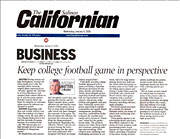Integrity Matters
January 4, 2006
Keep college football game in perspective

 Question: (E-221)
Question: (E-221)
Dear Jim:
During recent college bowl games, several referees
made poor calls. For example, those wearing striped shirts
announced an "off side" against the University
of Iowa Hawkeyes that stopped their valiant efforts to
tie or win the game against Florida's Gators. How can
there be integrity in outcomes when errors by referees
are allowed to stand?
 Response:
Response:
Regarding calls that cost a team victory, consider
the wisdom of a major college coach. He said, after a
very disappointing loss in the last few seconds of a
game because of a controversial call: "We did not
play at a high enough level to absorb surprises or disappointments."
By implication, this mature and thoughtful coach was
suggesting that had he and his fellow coaches done a
more effective job and had his team played a better game,
one or two or even three contested calls would not have
changed the outcome of the game. He did not blame the
referees. He accepted the outcome, handling the disappointment
appropriately. Regarding the referee's "blown" call
you referenced during the Iowa-Florida game, has the
situation been addressed with integrity? Did those in
charge behave responsibly?
Until fairly recently, college football appeared to
be a game, providing a Saturday afternoon diversion for
students, faculty and alumni. Today, intercollegiate
sports, especially football and basketball, are big business
with mission statements, stakeholders and gigantic cash
paydays. University sports programs expecting to remain
competitive use superb brand management, marketing expertise,
multimillion-dollar contracts for coaches and media-savvy
venues to "showcase" talent for the professional
ranks. The gridiron classics are today about television
revenues, national rankings and recruiting. With cameras
now validating and challenging decisions by referees,
will it be long before playing fields and uniforms are
wired with electronics to monitor play on the field?
Are we taking sports games and trying to make them, especially
football, into a flesh-and-blood violent video game,
complete with a rewind mechanism, called replay? Humans,
including referees, make mistakes.
The bowl season accounts for a month of contests between
teams, too many of which lack convincing won-loss records.
These games appear to be advertising-driven television
time-fillers, tailored to the needs of couch potatoes
with purchasing power. Loyal alumni are encouraged to
buy tickets, providing a backdrop of fan-noise during
student-athlete auditions for professional scouts. How
many legitimate bowls can there be with a 120 big-school
programs?
Not as many as have mutated, which may account for some
of the poorer calls on the field. What kinds of incredible
pressures are being placed on those who coach, play and
referee? Is it really about blown calls or guaranteed revenue
generation? This question is not about imperfect referees
as much as it is about seeing sports in the right proportion.